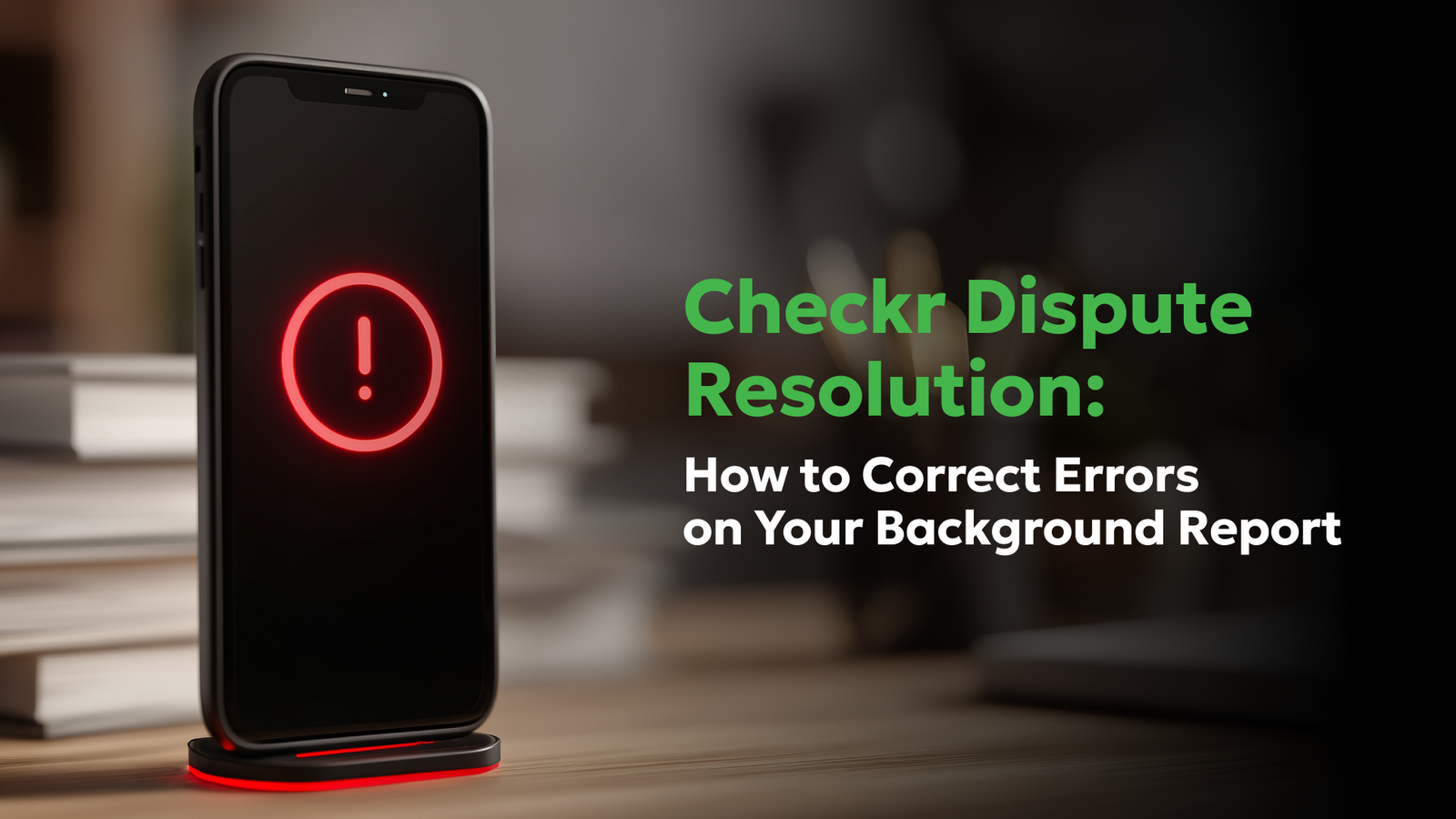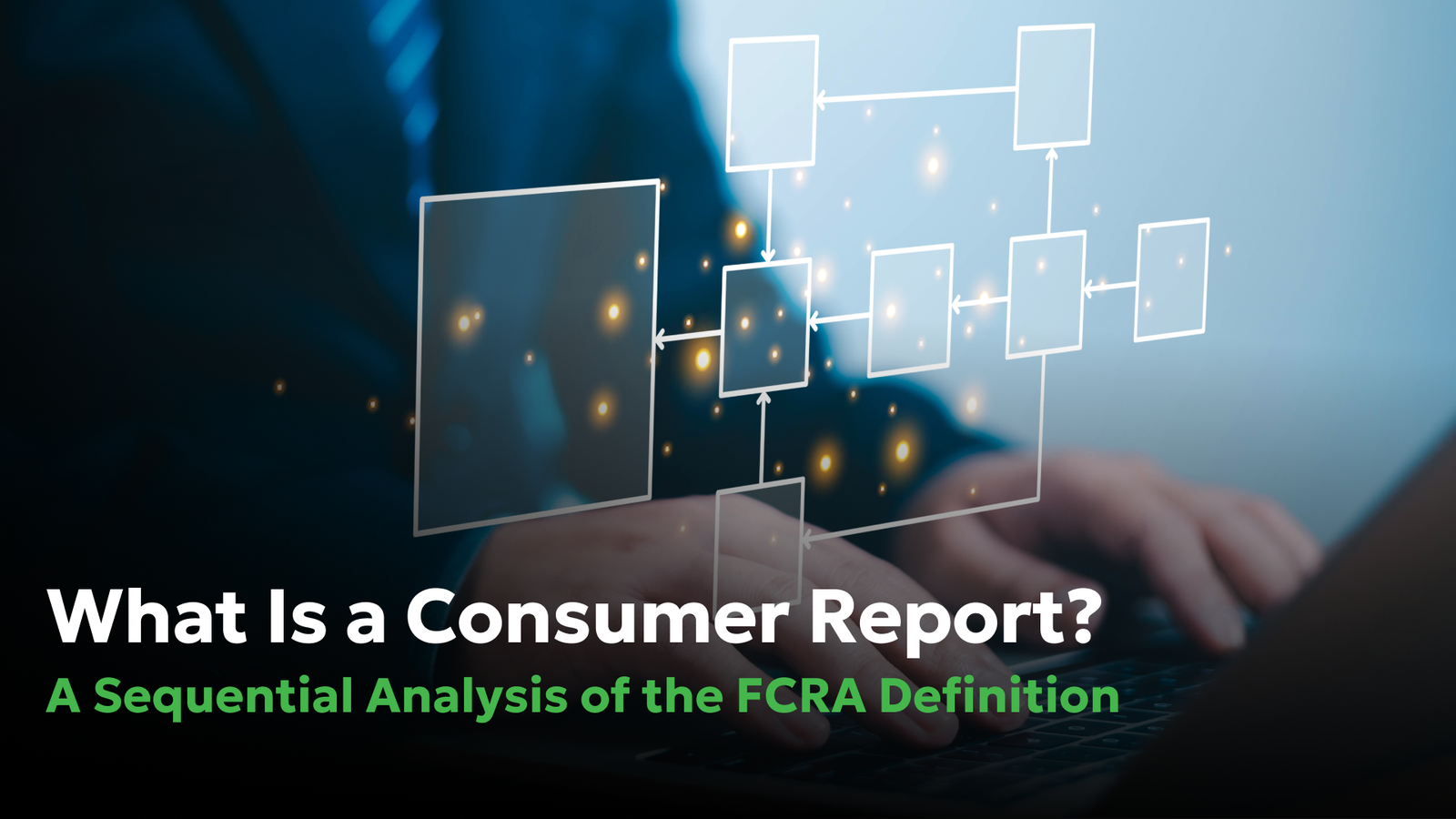What You Need to Know About Independent Contractor Background Checks
- Blog
- All about FCRA
What You Need to Know About Independent Contractor Background Checks

Everything You Need to Know about Independent Contractor Background Checks and How the Law Protects You!
If you’re an independent contractor and ever wondered if companies can drug test contractors or run background screenings on 1099 workers, we’ve got you covered. We explain what an independent contractor is and what laws govern the workplace when you work as a 1099, self-employed worker. Read on to learn more!
Some employers hire independent contractors (1099 workers) instead of traditional “W-2 employees” for several reasons. Some employers prefer to hire independent contractors because it is often easier to hire and fire 1099s as opposed to regular employees. Additionally, some employers prefer contractors because of liability reasons. Employers are often less liable for the actions of 1099 workers since they are independent contractors and contracted to complete specific jobs and in essence, work for themselves. Even though independent contractors are not “regular” employees, employers still have to abide by labor laws, including the rules governing background checks.
If an employer requires an independent contractor background check as a requirement for a contract position, (1099) employees will have to adhere to the screening, or they may not be considered for the contract. Nevertheless, both W-2 employees and contractors must consent to background checks before employers can have them screened.
If a 1099 employee does not consent to a contractor background screening, and a client screens them anyway, the client will be in violation of federal laws governing background checks. Keep reading to learn more about independent contractors, contractor background checks, and when you should contact a background check lawyer if you believe your rights have been violated.
Can You Run a Background Check on an Independent Contractor?
Yes – independent contractors can be screened. Clients can conduct background checks on independent contractors with certain conditions. So, background checks for independent contractors is possible, but depends on several factors.
According to the Federal Trade Commission (FTC), the Fair Credit Reporting Act (FCRA) protects workers during background checks and applies to both permanent employees and independent contractors. However, there are mixed reviews regarding this issue since some court decisions have decided otherwise.
A Hybrid Model
The Society for Human Resource Management (SHRM) is a non-profit organization well-known in employment spaces that published an article with a hybrid background check suggestion from thought leaders in this area. A hybrid model is feasible since there is mixed guidance on whether independent contractors are covered under the FCRA. Some background check professionals have suggested that instead of arguing against the FTC or court rulings, a “hybrid” approach should be taken.
Traditionally, many employers have applied the FCRA’s requirements to ALL applicants including independent contractors. However, with a hybrid model, it’s suggested that there should be a separate screening policy for independent contractors in which HR should disclose and receive authorization from 1099 workers under a “non-employment purpose that is permissible.” One such purpose is the “option to screen with written instructions of the consumer.” After this step, it’s suggested that employers can follow the FCRA’s “employment-purpose provisions.”
Written Consent + FCRA Provisions
Here’s what you need to know as a contractor - if a client would like to run a background screening on you, there should be an independent contractor background check clause included in the work contract that you sign. The clause may mention something along the lines of a “self-employment background check” or a proof of employment for independent contractors clause that states that the client will request that a background check be conducted.
It's important that any contracts you sign include background check language in order for the check to be compliant with the law. If for some reason a background check is conducted without a contractor’s written consent, the company (both the client), and the screening company can be held liable for acting outside of the parameters of the law.
Defining an Independent Contractor
An independent contractor is an individual who is a “worker” and is not an employee of a particular company but works for a firm for a specific project on a contractual basis. Independent contractors are self-employed and have the liberty of working for several companies at one time if there are no conflicts of interest.
The IRS differentiates between an independent contractor and an employee based on if the “payer” or client has a right to control or direct the outcome of the person’s work and not what will be done and how it will be done. In other words, independent contractors have the freedom to do their jobs how they want without interference from anyone. The only thing that a payer has the right to direct is the “result” or outcome of an independent contractor’s work.
For example, if someone is a 1099 janitor and is hired to clean a building, and the client says the building must be cleaned by a certain day and time, the janitor has the right to use his preferred tools to get the job done by the specified day and time. The client would violate the law if they attempted to dictate every step in the cleaning process since the janitor is not the client’s employee. On the other hand, if the janitor were the client’s employee, the client would have more liberty to dictate exactly how the building should be cleaned, what cleaning tools should be used, etc. Essentially, 1099 workers usually have more freedom to perform their job functions how and when they want without micromanagement whereas, employees usually do not have the same freedom.
The Importance of Running a Background Check on an Independent Contractor
Running background checks on contractors is important for many reasons. Even though independent contractors may be hired for short-term work, they are an integral part of companies.
Contractors can influence business in many ways by their actions and character. Contractors with questionable characters may be at risk of adversely affecting business operations, reputation, physical assets, employees, and money. Therefore, businesses should consider running background checks on independent contractors for the following reasons:
- Mitigates hiring risks. Screening contractors allows employers to determine if contractors pose a security risk since they will have access to sensitive and proprietary information.
- Verifies qualifications. Background checks help verify the information the contractor included on their application.
- Promotes workplace safety. By screening a contractor’s criminal history, an employer can avoid contracting with someone with a violent history.
- Promotes equity. Screening independent contractors can create a culture of accountability and fairness amongst ALL workers (both employees and 1099s) because all workers will undergo screenings prior to working and not just a select few.
- Helps avoid legal liabilities. Background checks help avoid legal liability because it confirms the credibility of an applicant’s credentials, education, work experience, etc.
What Does an Independent Contractor Background Check Include?
As an independent contractor, you may wonder what kind of background check is conducted by clients or whether you will ever be subjected to a check. Sometimes independent contractor background checks are referred to as background checks for self-employed workers and include a variety of useful information.
Background checks on independent contractors can encompass a variety of screening elements, which may include:
- Identity verification: Age, Social Security number, birth date, and so on
- Employment verification: If contractors worked for companies in the past, running an employment verification check can help ensure the accuracy of the positions worked for the stated time
- Education verification: This ensures that the education qualifications provided are accurate
- Motor vehicle records: For some roles that require driving like (rideshare positions), driving history checks are essential and will usually be conducted as a prerequisite to contracting with the company
- Criminal records check: A national criminal database search screens independent contractors’ criminal histories for previous offenses including violent crimes
- Sex Offender Registry: Background check companies search national sex offender databases for sex offender crimes
- Licensing credentials checks: These searches confirm the authenticity of licenses, certificates, and other professional credentials
- Credit checks: Some positions of trust like those in the financial industry may require a credit check
- Reference checks: For contractors who have been self-employed for most of their careers, it can be helpful to validate the information they provided with personal and professional reference statements
How to Run a Background Check on an Independent Contractor
How to run a contractor screening will be contingent on the company that is hired to conduct the background check and whether the screening should be a standard screening or one that requires federal security clearance. For standard background checks, a 1099 candidate’s consent must be given, their identity will be verified (name, Social Security number, date of birth, etc.). Additionally, the background check may include a criminal history check, employment verification, education verification, and a credit check if relevant to the role.
Costs of Running an Independent Contractor Background Check
The cost of running an independent contractor background check varies based on depth and provider. Basic checks (identity and criminal history) usually range from $20 to $50. Comprehensive checks (including employment and education verification) cost between $50 and $150. Advanced checks, which may include credit checks, range from $100 to $300. Federal security clearance checks are the most expensive, ranging from $500 to $2,000 or more. Costs vary based on the specific needs of the check.
Can You Drug Test an Independent Contractor?
Yes, companies can drug test independent contractors, but must comply with state laws. Just like background checks, drug testing must adhere to legal regulations. The type of drug testing panel required depends on whether the contractor is a government worker. If so, government contractor background check requirements must be met for both drug tests and other screenings.
Even though background checks for contractors help safeguard businesses and teams, 1099 workers still retain rights and can dispute errors when they are found. Consult with our consumer protection lawyers.
Frequently Asked Questions
It depends. Sometimes contract work will show up on certain parts of a background check. Contract workers are independent contractors and do not go through conventional employment channels like payroll or health benefits, so 1099 experience may not be reflected in all databases used for standard background checks. However, additional parts of background screenings may reveal contract assignments through sources like income tax returns, reference checks, and public records. Employment verification processes might also uncover contract work if previous clients or employers provide that information. The extent of visibility largely depends on the thoroughness of the background check and the sources consulted.
The cost of a background check varies depending on the company and the screening that is being requested. A typical report may range from $20 to $100 per person, depending on the information required and the number of data sources consulted. Basic checks, including criminal record and sex offender registry searches, generally start at $25. More comprehensive verifications, such as employment, education, DMV, and federal record checks, usually range from $50 to $100 per person. Costs can increase if background checks require additional verification and searches. Some companies provide custom pricing for companies that will utilize their services several times throughout the year.
Usually, a builder's license will need to be checked for any complaints filed with the state licensing board. Clients can also do some research on their own by reviewing Google and Yelp reviews to assess their experience and testimonials from other clients. Additionally, public records can provide information about other records such as tax liens, lawsuits, and judgments. Along with this research, most screening companies will conduct a screening by verifying identity, and searching for a criminal history, and administering drug tests when necessary. The extent of the background check will depend on whether federal contractor requirements must be met, as federal or government contractors typically require more extensive screening.
Self-employed background checks are typically used to verify whether a contractor has legitimately worked for themselves. However, self-employment may not appear on a background check, so companies use other means to confirm the accuracy of the information provided. These methods include reviewing tax returns, invoices, and client contracts, conducting reference checks with clients or business partners, and examining public records for business registrations and professional licenses. Additionally, a review of credit reports and online presence can offer further insights. By using these methods, companies can ensure that the self-employment claims are legitimate and accurate.
Freelance jobs are not considered regular employment, so they usually don’t appear in basic employment background checks. Freelancers are categorized as independent contractors, not business employees, and their work information is not typically recorded by human resource departments. However, companies can verify freelance work through other means, such as reviewing tax returns, invoices, and client contracts, conducting reference checks with clients, and examining public records for business registrations. Financial checks may also reveal self-employed freelance work. By using these deeper checks, companies can accurately verify a freelancer's work history and ensure the information provided is legitimate.
To confirm the employment of an independent contractor, several methods can be used. Contacting the contractor's clients can provide insights into the working relationships and the quality of work delivered. Verifying certifications and educational background ensures they meet the required qualifications. Searching public records can reveal any legal filings and financial information relevant to the contractor. Additionally, reviewing the contractor's detailed project history, including collaborations with other professionals, can further substantiate their work experience. These checks help verify the accuracy of the contractor's application and ensure they are a reliable candidate. If you’re an independent contractor and you believe an employer violated employment verification procedures required for independent contractors, contact one of our consumer law attorneys for assistance.


Daniel Cohen is the Founder of Consumer Attorneys. Daniel manages the firm’s branding, marketing, client intake and business development efforts. Since 2017, he is a member of the National Association of Consumer Advocates and the National Consumer Law Center. Mr. Cohen is a nationally-recognized practitioner of consumer protection law. He has a we... Read more
Related Articles




R
ONGS™You pay nothing. The law makes them pay.







